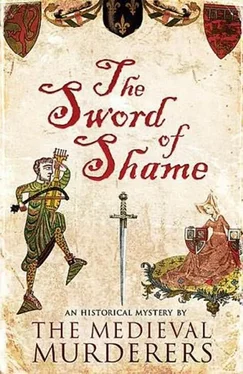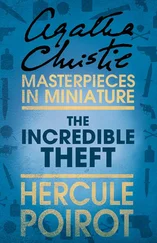The Medieval Murderers - Sword of Shame
Здесь есть возможность читать онлайн «The Medieval Murderers - Sword of Shame» весь текст электронной книги совершенно бесплатно (целиком полную версию без сокращений). В некоторых случаях можно слушать аудио, скачать через торрент в формате fb2 и присутствует краткое содержание. Жанр: Исторический детектив, на английском языке. Описание произведения, (предисловие) а так же отзывы посетителей доступны на портале библиотеки ЛибКат.
- Название:Sword of Shame
- Автор:
- Жанр:
- Год:неизвестен
- ISBN:нет данных
- Рейтинг книги:4 / 5. Голосов: 1
-
Избранное:Добавить в избранное
- Отзывы:
-
Ваша оценка:
- 80
- 1
- 2
- 3
- 4
- 5
Sword of Shame: краткое содержание, описание и аннотация
Предлагаем к чтению аннотацию, описание, краткое содержание или предисловие (зависит от того, что написал сам автор книги «Sword of Shame»). Если вы не нашли необходимую информацию о книге — напишите в комментариях, мы постараемся отыскать её.
Sword of Shame — читать онлайн бесплатно полную книгу (весь текст) целиком
Ниже представлен текст книги, разбитый по страницам. Система сохранения места последней прочитанной страницы, позволяет с удобством читать онлайн бесплатно книгу «Sword of Shame», без необходимости каждый раз заново искать на чём Вы остановились. Поставьте закладку, и сможете в любой момент перейти на страницу, на которой закончили чтение.
Интервал:
Закладка:
As I’d said to Martha, I had nothing with me apart from the clothes I stood up in. There wasn’t much to detain me in this little room either. So, picking up the grease-pan which held the candle, I made my way back down the stairs and along the passageways which Martha and I had threaded moments earlier. I passed the kitchen. A woman was standing over the table, working a pestle and mortar. I stopped. She glanced up. It was Abigail, the housekeeper. Evidently she had abandoned her sentry-duty outside Elias’s door. The light was stronger in the kitchen, a combination of fire and candles, and I could see surprise, even suspicion, on her face before she recognized me.
‘You are staying the night, master?’
‘It seems so.’
‘You need more blankets?’
‘I’ll manage,’ I said. ‘Don’t trouble yourself.’
She snorted and returned to her work. Over her shoulder I could see a girl struggling with pots and pans.
I walked on and after a couple of false turnings reached the entrance hall where there was a table which had been laid for supper and which was already occupied.
It took me a little time to work it out but eventually I understood that the carrion bird names which Elias had bestowed on his cousins-crow, vulture and so on-were not only linked to the way that they came flocking to the house at the first whisper of his illness. The names were also suggested by the appearance of these men. By the better light around the supper table I had a chance to study my fellow-guests. This was a beaky, big-nosed family-undoubtedly it was the lack of this feature which had caused the disrespectful Davey Parsons at the gate to tell me that I hadn’t got the nose-and it made them look bird-like. Elias too was long-nosed and even Martha’s was slightly too large for her face.
The three men whom I’d first encountered on my arrival were at table. The old man, with stick and spectacles, was called Valentine. He was stooped with age and mumbled his words and his food together in one spittly stream. Fortunately, he didn’t say much but he was sharp enough when he wanted to be. He looked closer to death than Elias Haskell lying in bed at the other end of the house. From some remark, I learned Valentine lived in Cambridge. I doubt that he’d have been able to travel any more than a handful of miles to visit his ‘dying’ cousin, and marvelled that he’d come as far as he had. He had no occupation-the old are exempt from all that. The stoutish, middle-aged individual with the close-fitting cap of grey hair was Cuthbert. He was a lawyer hailing from, I think, Peterborough. The third man, the one who’d been standing by the chimney-piece when I arrived, was called Rowland. He was a merchant from Huntingdon. They were Haskells by name, every one of them. This simplified matters, I suppose.
Elias Haskell had mentioned four carrion birds, though. An empty place at the table indicated that someone was still expected. I wondered who this person was. It seemed unlikely that he would arrive now, in the darkness of a winter evening and through the perils of a snow-storm. Meantime I was glad enough of the food, which was plain and wholesome-beef and barley bread, brawn soused in beer, and so on. The service was plain too, at the hands of the other servant I’d glimpsed in the kitchen and who, judging by her narrow mouth, was sister to the porcine girl in the lodge. The guests at the table kept darting wary glances at me, and from one or two remarks dropped by Martha I guessed that she’d spun them some story about Elias’s interest in the playhouse to account for my presence in Valence. Perhaps they had jumped to the conclusion that the old man was going to leave his money to a troupe of players.
They made a couple of perfunctory enquiries about the health-or more precisely the sickness-of the man in the neighbour room and I noticed that Martha made Elias out to be rather worse than he had seemed to be. I wasn’t sure whether she was doing this on her own initiative or because he had instructed her to give a bad report. I noticed also in the three men a kind of satisfaction, which they scarcely bothered to conceal, that their cousin continued in his apparent decline. They were curious to know what we’d talked about.
‘This and that,’ I said. ‘He showed me Grant the monkey.’
‘And did he show you the sword?’ said Rowland Haskell.
‘That rusty old thing,’ said Cuthbert.
‘I saw a sword over the chimney-piece,’ I said.
‘Elias believes it can sprout wings,’ said Rowland.
‘Pah! Superstition!’ said Cuthbert.
‘Stranger things have happened,’ said old Valentine.
Rowland the merchant turned to me at another point during the meal and said, ‘That William Shakespeare is one of your fellows, isn’t he?’
‘He is a shareholder in the Globe. Sometimes he’s a player but mostly he’s a writer.’
‘I saw his play about the mad Dane who murdered his uncle.’
‘That is Hamlet ,’ I said. ‘But the Prince was provoked and it was not altogether murder. The uncle had killed his father first.’
‘There was a deal of killing anyway,’ said Rowland. ‘And a lot of silly talk about hawks and handsaws and crabs going backwards.’
‘ I saw one of his plays in London,’ said Cuthbert the lawyer, narrowing his eyes as if he were examining me in court. ‘I chiefly remember a single line in it. Do you know what it was?’
‘No, but you are about to tell me, sir.’
‘The line was “The first thing we do, let’s kill all the lawyers”.’
‘Kill all the lawyers,’ I repeated.
I must say that, in the present company, I rather relished the words and perhaps I didn’t much bother to conceal the fact.
‘Good, good,’ said Valentine, ‘Kill all the lawyers. That would be a start.’ The old man’s spectacles glinted sightlessly in the candlelight.
‘Is that Master Shakespeare’s true opinion, do you think, Master Revill?’ said Cuthbert. ‘That the world would be a better place if we lawyers were all…no more?’
This might be quite close to William’s opinion-certainly it is the view of plenty of other people in this island of ours-but I said, ‘I do not think so, sir. Words only, from a character in a play.’
‘I deal in words,’ said Cuthbert.
‘You’re no better than a tanner,’ said Valentine to his cousin. ‘You deal in skins. In the sheep-skins and calf-skins which you write your double words on.’
‘You dislike lawyers, sir?’ I said.
‘My father was a lawyer, sir,’ said Valentine, though he looked too old to have any father apart from Adam.
Cuthbert ignored all this, perhaps putting it down as the bitter ramblings of an old man. Instead he simply grunted and levered another slice of brawn from the dish on the table. Now it was the turn of Rowland the merchant to accuse me and my kind.
‘But you can’t deny that you players are against authority, can you? That is why audiences are drawn to you. The people who attend your performances are not respectable people.’
‘Then you’d have to say that the King and Queen of England are not respectable,’ I said. ‘King James is our patron while Queen Anne has even performed in a masque.’
‘Oh, he is Scottish…’ said Cuthbert.
‘…and she is Danish,’ said Rowland. ‘Foreigners both.’
Cuthbert and Rowland Haskell looked slightly uneasy at this point as if a government agent might be about to sneak out of the wainscot and arrest them for treason. For my part, I would have welcomed one.
‘Uncle Elias likes plays,’ said Martha. ‘He remembers the old playhouses in London.’
What else she would have said to bring a bit of goodwill back to the conversation I don’t know because at that moment we were interrupted by a figure who swept into the hall and took her place at the table with a great fuss and bother. The missing guest was no man, as I’d expected, but a formidable-looking woman. I was startled because she bore more than a passing resemblance to our late queen-I mean, the great Elizabeth. This person had the same pinched face and aquiline nose and haughty manner. (And I should know because I was once in personal conversation with Queen Elizabeth for at least a quarter of an hour.) But the nose alone revealed this newcomer to the dining table to be yet another Haskell cousin. Also the way in which the three men reacted with impatience to her presence.
Читать дальшеИнтервал:
Закладка:
Похожие книги на «Sword of Shame»
Представляем Вашему вниманию похожие книги на «Sword of Shame» списком для выбора. Мы отобрали схожую по названию и смыслу литературу в надежде предоставить читателям больше вариантов отыскать новые, интересные, ещё непрочитанные произведения.
Обсуждение, отзывы о книге «Sword of Shame» и просто собственные мнения читателей. Оставьте ваши комментарии, напишите, что Вы думаете о произведении, его смысле или главных героях. Укажите что конкретно понравилось, а что нет, и почему Вы так считаете.












